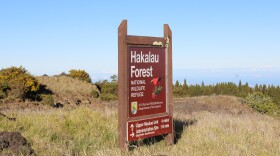Immigration raids are intensifying across the country — and so are protests opposing them. About 700 Marines are arriving in Los Angeles, where the National Guard has already been deployed.
Mayors and governors across the country are bracing for more unrest as nationwide “No Kings" protests are planned for this Saturday.
Even immigrants with legal status are feeling uneasy as the Trump administration rolls back protections for those who have entered the country through programs such as Temporary Protected Status.
Here in Hawaiʻi, one particularly vulnerable immigrant community is made up of those in the country as part of COFA, the Compact of Free Association — an arrangement between the U.S. and island nations throughout Micronesia that gives citizens of those countries permission to live and work in the U.S. in exchange for a U.S. military presence in their homelands.
Austin Haleyalpiy is part of the Micronesian community and recently helped to relaunch COFA CAN, an advocacy organization group for COFA immigrants. Haleyalpiy spoke with The Conversation, beginning with a quick explainer about COFA.

“That is the agreement between the U.S. and three countries in the Micronesian region, namely the Republic of Palau, the Federated States of Micronesia, and the Republic of the Marshall Islands,” Haleyalpiy said. “That document allows citizens from these countries to travel to and from the United States without the need of a visa or a green card, just their passport.”
Once the citizens arrive in the U.S., they receive an I-94 and are free to live, work, attend school, and apply for different federal programs.
Last year, those in the U.S. under this unique arrangement were given access to federal benefits, including Social Security, food and education assistance, as well as FEMA disaster relief.
An estimated 20,000 to 30,000 Pacific immigrants are living in Hawaiʻi legally under COFA. Haleyalpiy said COFA CAN has been making sure its communities are staying prepared and informed.
“I want them to know that they are here legally, that they do have rights, just like anybody else in this country,” he said. “I want them to know that it is a good idea to keep their documents in order and updated, making sure that they know where they are if they need to access them for anything. And I want everybody to know what the resources are."
Haleyalpiy shared that some people in COFA communities have feared being lumped in with the broader immigrant community.
“When we're talking about as far as things that are coming down from the federal level, again, we have our unique status, and so it just brings me back to wanting to make sure that our communities are informed and that they're not graying the lines, comparing our statuses to other folks in their statuses,” he told HPR.

“I think what I would like to say to listeners is just really take a step back and just think about your own story, your own migration story, and how you got here, thinking about your family's history. It's not so far off when we compare it to other stories of immigrants, especially here in Hawaiʻi, he said.
“I think when we break it all down, we're all just trying to live and make our respective communities better and make our living conditions better."
This story aired on The Conversation on June 12, 2025. The Conversation airs weekdays at 11 a.m. Hannah Kaʻiulani Coburn adapted this story for the web.




